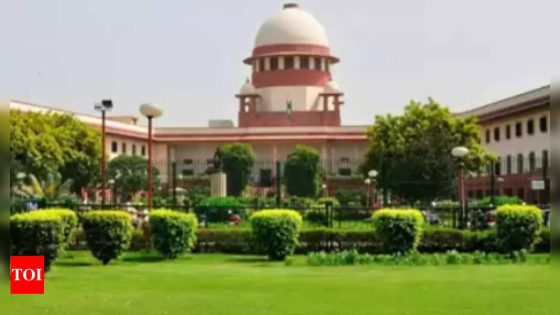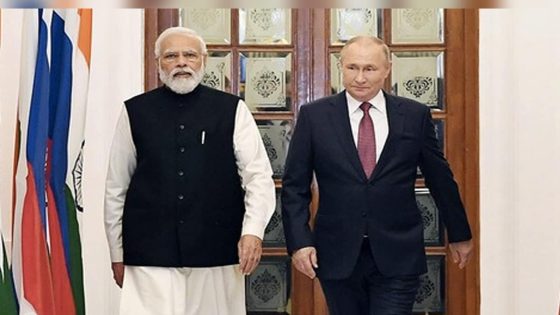NEW DELHI: In an important ruling, Supreme Court Tuesday held that the conventional idea ‘bail is the rule, jail is an exception’ should be applicable not only to IPC offences but also to others for which special statutes like Unlawful Activities (Prevention) Act have been enacted if the conditions prescribed under that law are fulfilled.
While granting bail to a former constable of Bihar Police who was charged under the stringent UAPA because of his alleged association with the outlawed Islamist outfit Popular Front of India (PFI), a bench of Justices Abhay S Oka and Augustine George Masih emphasised that courts should not hesitate in granting bail in serious offences if a case is made out for bail.
Recently, the apex court, through its various verdicts, had diluted stringent provisions for bail under special laws, like it did in the Manish Sisodia case when it held that delay in trial and long incarceration could be grounds for bail despite the tough triple test in the anti-laundering act PMLA.
Interestingly, just six months ago on Feb 9, another SC bench had held that ‘bail is the rule, jail is an exception’ was not applicable when an accused was facing charges under anti-terror law UAPA and, also, held that delayed trial proceedings in grave offences could not be a ground to seek bail.
In the case on Tuesday, the court noted that the accused had been in custody for more than two years and the trial had not commenced. It said the trial court and Patna high court erred in rejecting his bail plea as they did not objectively analyse the evidence and their main focus was on the activities of PFI which the accused was alleged to be associated with.
“When a case is made out for grant of bail, courts should not have any hesitation in granting bail. The allegations of the prosecution may be very serious. But the duty of courts is to consider the case for grant of bail in accordance with the law. ‘Bail is the rule and jail is an exception’ is a settled law. Even in a case like the present case where there are stringent conditions for the grant of bail in the relevant statutes, the same rule holds good with the only modification that bail can be granted if the conditions in the statute are satisfied. The rule also means that once a case is made out for grant of bail, the court cannot decline to grant bail. If courts start denying bail in deserving cases, it will be a violation of the rights guaranteed under Article 21 of our Constitution,” the bench said.
On Feb 9, the court had ruled to the contrary. “The conventional idea in bail jurisprudence vis-a-vis ordinary penal offences that the discretion of courts must tilt in favour of the oft-quoted phrase ‘bail is the rule, jail is the exception’, unless circumstances justify otherwise, does not find any place while dealing with bail applications under UAPA. The ‘exercise’ of the general power to grant bail under UAPA is severely restrictive in scope. The form of the words used in proviso to Section 43D (5) — ‘shall not be released’ — in contrast with the form of the words as found in Section 437(1) CrPC — ‘may be released’ — suggests the intention of the legislature to make bail the exception and jail the rule,” the court had said.
In the Patna case, the prosecution alleged that the accused was associated with PFI and he let out one floor of his house to members of the outfit to carry out illegal activities. It was also alleged that he was part of the meeting where PFI members discussed plans to kill BJP’s Nupur Sharma for her statements on Prophet Mohammed. But the court said the evidence and statements of witnesses falsified the allegation that he was present in the meeting.
The court said there was nothing in the chargesheet which showed that the accused had taken part or had committed unlawful activities as defined in UAPA and no specific material was there to show that he advocated, abetted or incited commission of any unlawful activities.
Analysing the evidence and statements of witnesses threadbare, the bench said on plain reading of the chargesheet, it was not possible to record a conclusion that there were reasonable grounds for believing that the charges against the accused of commission of offences punishable under UAPA were prima facie true.
“There is not even an allegation in the chargesheet that the appellant was a member of any terrorist gang. As regards the second part of being a member of a terrorist organisation, as per Section 2(m), a terrorist organisation means an organisation listed in the first schedule or an organisation operating under the same name as the organisation was listed. The chargesheet does not mention the name of the terrorist organisation within the meaning of Section 2(m) of which the appellant was a member. We find that PFI is not a terrorist organisation, as is evident from the first schedule,” it said. PFI and its affiliates were termed “unlawful association” under UAPA and banned by govt in Sept 2022. The first schedule of UAPA lists terrorist organisations.
While granting bail to a former constable of Bihar Police who was charged under the stringent UAPA because of his alleged association with the outlawed Islamist outfit Popular Front of India (PFI), a bench of Justices Abhay S Oka and Augustine George Masih emphasised that courts should not hesitate in granting bail in serious offences if a case is made out for bail.
Recently, the apex court, through its various verdicts, had diluted stringent provisions for bail under special laws, like it did in the Manish Sisodia case when it held that delay in trial and long incarceration could be grounds for bail despite the tough triple test in the anti-laundering act PMLA.
Interestingly, just six months ago on Feb 9, another SC bench had held that ‘bail is the rule, jail is an exception’ was not applicable when an accused was facing charges under anti-terror law UAPA and, also, held that delayed trial proceedings in grave offences could not be a ground to seek bail.
In the case on Tuesday, the court noted that the accused had been in custody for more than two years and the trial had not commenced. It said the trial court and Patna high court erred in rejecting his bail plea as they did not objectively analyse the evidence and their main focus was on the activities of PFI which the accused was alleged to be associated with.
“When a case is made out for grant of bail, courts should not have any hesitation in granting bail. The allegations of the prosecution may be very serious. But the duty of courts is to consider the case for grant of bail in accordance with the law. ‘Bail is the rule and jail is an exception’ is a settled law. Even in a case like the present case where there are stringent conditions for the grant of bail in the relevant statutes, the same rule holds good with the only modification that bail can be granted if the conditions in the statute are satisfied. The rule also means that once a case is made out for grant of bail, the court cannot decline to grant bail. If courts start denying bail in deserving cases, it will be a violation of the rights guaranteed under Article 21 of our Constitution,” the bench said.
On Feb 9, the court had ruled to the contrary. “The conventional idea in bail jurisprudence vis-a-vis ordinary penal offences that the discretion of courts must tilt in favour of the oft-quoted phrase ‘bail is the rule, jail is the exception’, unless circumstances justify otherwise, does not find any place while dealing with bail applications under UAPA. The ‘exercise’ of the general power to grant bail under UAPA is severely restrictive in scope. The form of the words used in proviso to Section 43D (5) — ‘shall not be released’ — in contrast with the form of the words as found in Section 437(1) CrPC — ‘may be released’ — suggests the intention of the legislature to make bail the exception and jail the rule,” the court had said.
In the Patna case, the prosecution alleged that the accused was associated with PFI and he let out one floor of his house to members of the outfit to carry out illegal activities. It was also alleged that he was part of the meeting where PFI members discussed plans to kill BJP’s Nupur Sharma for her statements on Prophet Mohammed. But the court said the evidence and statements of witnesses falsified the allegation that he was present in the meeting.
The court said there was nothing in the chargesheet which showed that the accused had taken part or had committed unlawful activities as defined in UAPA and no specific material was there to show that he advocated, abetted or incited commission of any unlawful activities.
Analysing the evidence and statements of witnesses threadbare, the bench said on plain reading of the chargesheet, it was not possible to record a conclusion that there were reasonable grounds for believing that the charges against the accused of commission of offences punishable under UAPA were prima facie true.
“There is not even an allegation in the chargesheet that the appellant was a member of any terrorist gang. As regards the second part of being a member of a terrorist organisation, as per Section 2(m), a terrorist organisation means an organisation listed in the first schedule or an organisation operating under the same name as the organisation was listed. The chargesheet does not mention the name of the terrorist organisation within the meaning of Section 2(m) of which the appellant was a member. We find that PFI is not a terrorist organisation, as is evident from the first schedule,” it said. PFI and its affiliates were termed “unlawful association” under UAPA and banned by govt in Sept 2022. The first schedule of UAPA lists terrorist organisations.
Source Agencies



